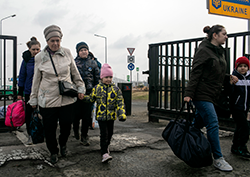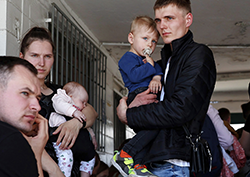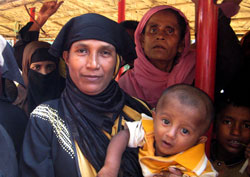BRIEFING CALL: The Humanitarian Response in Ukraine
By Ayelet Parness, HIAS.org
Mar 10, 2022
Watch the March 9 Briefing Call.
Jewish communities across Europe have shown an “immense outpouring of solidarity” in response to the crisis in Ukraine, Ilan Cohn, director of HIAS Europe, told an audience of more than 700 people during a special briefing call on March 9.
Cohn, along with Carrie Taneyhill, HIAS’ director of emergency and humanitarian response, reported on the situation at the Polish-Ukrainian border and nearby refugee reception centers following a visit last week. While they were there, they helped coordinate HIAS’ response with local organizations and plan future action. HIAS’ efforts have focused not only on providing an immediate response to the crisis but on establishing a basis for sustained efforts.
“This is a marathon, not a sprint,” explained Taneyhill. “This is a crisis that is not going away tomorrow. As this crisis continues… the people who are coming over are going to be more and more vulnerable.”
HIAS has released funding to Ukrainian partner Right to Protection (R2P) to relocate their headquarters – previously located in Kyiv – to Lviv, which is in Western Ukraine, further from conflict. From that new office, they can continue their work, supporting individuals displaced by the conflict and helping those fleeing Ukraine to obtain the resources and documentation they will need to cross the border.
HIAS has also been providing funding to and coordinating the response between Jewish communities in neighboring countries: Poland, Slovakia, and Moldova. Poland has welcomed the majority of the over 2.3 million people who have already fled Ukraine. According to Cohn, Warsaw’s Jewish community made extensive plans before the war broke out, giving them a leg up in leveraging their resources to best serve the influx of refugees. They have since established a crisis management group to coordinate their efforts.
“On the positive side, really all the organizations in the Warsaw Jewish community work together within that one group,” shared Cohn. “That’s quite unique.”
Unlike other recent refugee crises, Ukrainians are currently being welcomed with open arms in neighboring countries, and so a massive evacuation to the U.S. is not the best course of action at this moment.
“There are a lot of safe places, thankfully, for this group of refugees,” said Melanie Nezer, HIAS senior vice president of global public affairs. “I wish that were true for everybody. The U.S. will be an appropriate option for some of them, but not for all of them.”
Instead, the U.S. should provide humanitarian aid to surrounding countries while making use of existing programs to resettle in the U.S. the most vulnerable Ukrainians and those with family here. One such program, the Lautenberg Amendment, allows religious minorities from the former Soviet Union with close family ties in the U.S. to join them as refugees. The program, initially enacted in 1990, has not yet been renewed for this year but is included in the spending bill expected to pass later this week, explained Mark Hetfield, HIAS president and CEO.
“We’re urging the United States government to reopen that program and allow people to apply to reunite with family on an urgent basis,” said Hetfield.
Learn more about HIAS’ response to this crisis.



